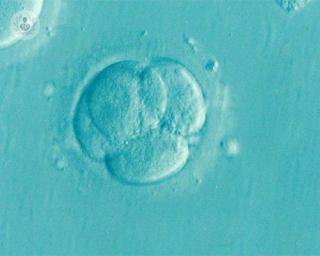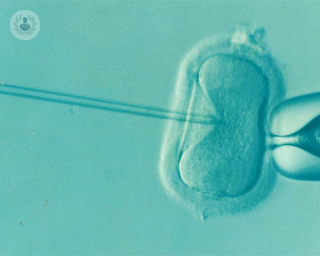What is in vitro fertilisation?
In vitro fertilisation (IVF) is a procedure in which an egg is combined with sperm outside the body, in a laboratory. Once fertilised, the egg is transferred to the woman’s uterus, with the goal of successful pregnancy. It is a common fertility treatment.

Why is in vitro fertilisation performed?
This treatment is an option which can help a woman to become pregnant, in the case of infertility problems, such as:
- Clogged or damaged fallopian tubes
- Advanced maternal age
- Male sterility factor
- Endometriosis
- Unexplained sterility
What happens during in vitro fertilisation?
IVF requires several steps to achieve ultimate success:
- Suppressing the menstrual cycle: with the aid of medication, the regular menstrual cycle is suppressed
- Controlled boost of egg supply: the woman receives a hormonal treatment with medication for approximately 10 days. This is done to stimulate the production of ovules, meaning a greater quantity becomes available. This medication also makes it possible to control the time of ovulation and thus increase the chances that the ovules obtained are suitable for fertilisation.
- Ovarian or follicular puncture: a surgical procedure that consists of extracting the mature ovules from the ovary. The process is carried out by aspiration under anaesthesia and sedation and lasts between 20 and 30 minutes.
- Fertilisation of eggs: the eggs are mixed with the sperm, allowing them to be fertilised
- Embryo transfer: the fertilised embryo are transferred to the womb
Preparing for in vitro fertilisation
The first step when considering any fertility treatment is to visit your GP, who can refer you on to a specialist, or to visit a private fertility specialist or clinic. Once at the clinic, the specialist will speak to you about your fertility history and conduct an examination if necessary.
If IVF is deemed to be the best treatment, you will then be referred for assisted conception. At the clinic or assisted conception unit you and your partner will need to have blood tests, screening tests for sickle cell anaemia and thalassaemia, and your egg count will be investigated.
Aftercare
Once the embryo transfer has been made, you should rest for the remainder of the day.
Generally, you’re advised to wait for 2 weeks before a pregnancy test can be carried out. This time can be stressful and the clinic may offer counselling or support. If the treatment has been successful (and it is important to remember that IVF is not always so), you will be offered regular antenatal care and monitored throughout the pregnancy.
12-29-2015 12-05-2023In vitro fertilisation (IVF)
Miss Kate Maclaran - Obstetrics & gynaecology
Created on: 12-29-2015
Updated on: 12-05-2023
Edited by: Kate Forristal
What is in vitro fertilisation?
In vitro fertilisation (IVF) is a procedure in which an egg is combined with sperm outside the body, in a laboratory. Once fertilised, the egg is transferred to the woman’s uterus, with the goal of successful pregnancy. It is a common fertility treatment.

Why is in vitro fertilisation performed?
This treatment is an option which can help a woman to become pregnant, in the case of infertility problems, such as:
- Clogged or damaged fallopian tubes
- Advanced maternal age
- Male sterility factor
- Endometriosis
- Unexplained sterility
What happens during in vitro fertilisation?
IVF requires several steps to achieve ultimate success:
- Suppressing the menstrual cycle: with the aid of medication, the regular menstrual cycle is suppressed
- Controlled boost of egg supply: the woman receives a hormonal treatment with medication for approximately 10 days. This is done to stimulate the production of ovules, meaning a greater quantity becomes available. This medication also makes it possible to control the time of ovulation and thus increase the chances that the ovules obtained are suitable for fertilisation.
- Ovarian or follicular puncture: a surgical procedure that consists of extracting the mature ovules from the ovary. The process is carried out by aspiration under anaesthesia and sedation and lasts between 20 and 30 minutes.
- Fertilisation of eggs: the eggs are mixed with the sperm, allowing them to be fertilised
- Embryo transfer: the fertilised embryo are transferred to the womb
Preparing for in vitro fertilisation
The first step when considering any fertility treatment is to visit your GP, who can refer you on to a specialist, or to visit a private fertility specialist or clinic. Once at the clinic, the specialist will speak to you about your fertility history and conduct an examination if necessary.
If IVF is deemed to be the best treatment, you will then be referred for assisted conception. At the clinic or assisted conception unit you and your partner will need to have blood tests, screening tests for sickle cell anaemia and thalassaemia, and your egg count will be investigated.
Aftercare
Once the embryo transfer has been made, you should rest for the remainder of the day.
Generally, you’re advised to wait for 2 weeks before a pregnancy test can be carried out. This time can be stressful and the clinic may offer counselling or support. If the treatment has been successful (and it is important to remember that IVF is not always so), you will be offered regular antenatal care and monitored throughout the pregnancy.


Understanding failed IVF attempts: Insight from a reproductive medicine specialist
By Dr Anu Chawla
2025-01-20
Navigating the journey of unsuccessful IVF attempts can be emotionally taxing for couples who have eagerly been hoping to start or grow their family. We spoke to Dr Anu Chawla, a renowned senior specialist in reproductive medicine to learn more about why IVF sometimes fails. The leading specialist also shares expert guidance on fertility treatments. See more


How does pre-implantation genetic screening (PGS) work?
By Dr Benjamin Abramov
2025-01-20
Having a baby is not always straightforward. Genetics and infertility can conspire to make starting a family seem like an impossibility. However, options such as IVF can help to maximise your chances. One such option is pre-implantation genetic screening (PGS), which can help to streamline the IVF process. Fertility specialist Dr Benjamin Abramov explains. See more


What are the chances of IVF working first time?
By Dr Benjamin Abramov
2025-01-20
For couples struggling to have a baby due to infertility, in vitro fertilisation (IVF) is an option many look to. What exactly are the chances of IVF working first time, and why do treatment cycles fail? Leading fertility specialist Dr Benjamin Abramov is here to explain. See more


What is the best treatment for PCOS?
By Dr Kaustubh Nisal
2025-01-20
Polycystic ovary syndrome (PCOS) is a complex condition that affects hormone levels, ovulation, and metabolism, with symptoms ranging from irregular periods and excessive hair growth to difficulty conceiving. The best treatment for PCOS depends on the individual's symptoms, health goals and whether they are looking to manage the condition or improve fertility. See more
Experts in In vitro fertilisation (IVF)
-
Mr Adrian Lower
Obstetrics & gynaecologyExpert in:
- Infertility
- Assisted reproductive technology
- Laparoscopy
- Hysteroscopy
- Fibroids
- In vitro fertilisation (IVF)
-
Mr Rajendra Rai
Obstetrics & gynaecologyExpert in:
- Recurrent miscarriage
- Infertility
- In vitro fertilisation (IVF)
- Pregnancy
- Endoscopic surgery
- Uterine malformations
-
Mr Ahmed Ismail
Obstetrics & gynaecologyExpert in:
- Infertility
- In vitro fertilisation (IVF)
- Miscarriage
- Sexually transmitted infections (STIs)
- Gynaecological examination
- Laser vaginal rejuvenation
-
Professor Ying Cheong
Fertility specialistExpert in:
- In vitro fertilisation (IVF)
- Infertility
- Endometriosis
- Recurrent miscarriage
- Polycystic ovary syndrome (PCOS)
-
Mr Julian Norman-Taylor
Fertility specialistExpert in:
- In vitro fertilisation (IVF)
- Laparoscopy
- Fibroids
- Intrauterine insemination (IUI)
- Fertility treatments
- Endometriosis
- See all

LycaHealth Canary Wharf
LycaHealth Canary Wharf
1 Westferry Circus, Canary Wharf. E14 4HD
No existe teléfono en el centro.
By using the telephone number provided by TOP DOCTORS, you automatically agree to let us use your phone number for statistical and commercial purposes. For further information, read our Privacy Policy
Top Doctors

The Kensington Wing - Private Maternity
The Kensington Wing - Private Maternity
Chelsea and Westminster Hospital, 3rd Floor, 369 Fulham Rd., London
No existe teléfono en el centro.
By using the telephone number provided by TOP DOCTORS, you automatically agree to let us use your phone number for statistical and commercial purposes. For further information, read our Privacy Policy
Top Doctors

The Parkside Suite Heatherwood
The Parkside Suite Heatherwood
Heatherwood Hospital, High Street, SL5 8AA, Berkshire
No existe teléfono en el centro.
By using the telephone number provided by TOP DOCTORS, you automatically agree to let us use your phone number for statistical and commercial purposes. For further information, read our Privacy Policy
Top Doctors
-
LycaHealth Canary Wharf
1 Westferry Circus, Canary Wharf. E14 4HD, Central LondonExpert in:
- Cardiology
- Dermatology
- Diagnostic Imaging
- Women’s health
-
The Kensington Wing - Private Maternity
Chelsea and Westminster Hospital, 3rd Floor, 369 Fulham Rd., London , Central LondonExpert in:
- Maternity care
- Ultrasound
- Pregnancy
- Multiple pregnancy
- Obstetrics and Gynaecology
- Pre-eclampsia
-
The Parkside Suite Heatherwood
Heatherwood Hospital, High Street, SL5 8AA, Berkshire, AscotExpert in:
- General Surgery
- Orthopaedic surgery
- Plastic surgery, reconstructive and aesthetics
- Obstetrics and Gynaecology
- Ophthalmology
- Urology
- See all
- Most viewed diseases, medical tests, and treatments
- Menopause support
- PGT-M
- Tubal factor infertility
- PGT-A
- Complex endometriosis
- Fertility preservation
- Female infertility
- Ovulatory disorders
- Surrogacy
- Pelvic ultrasound








